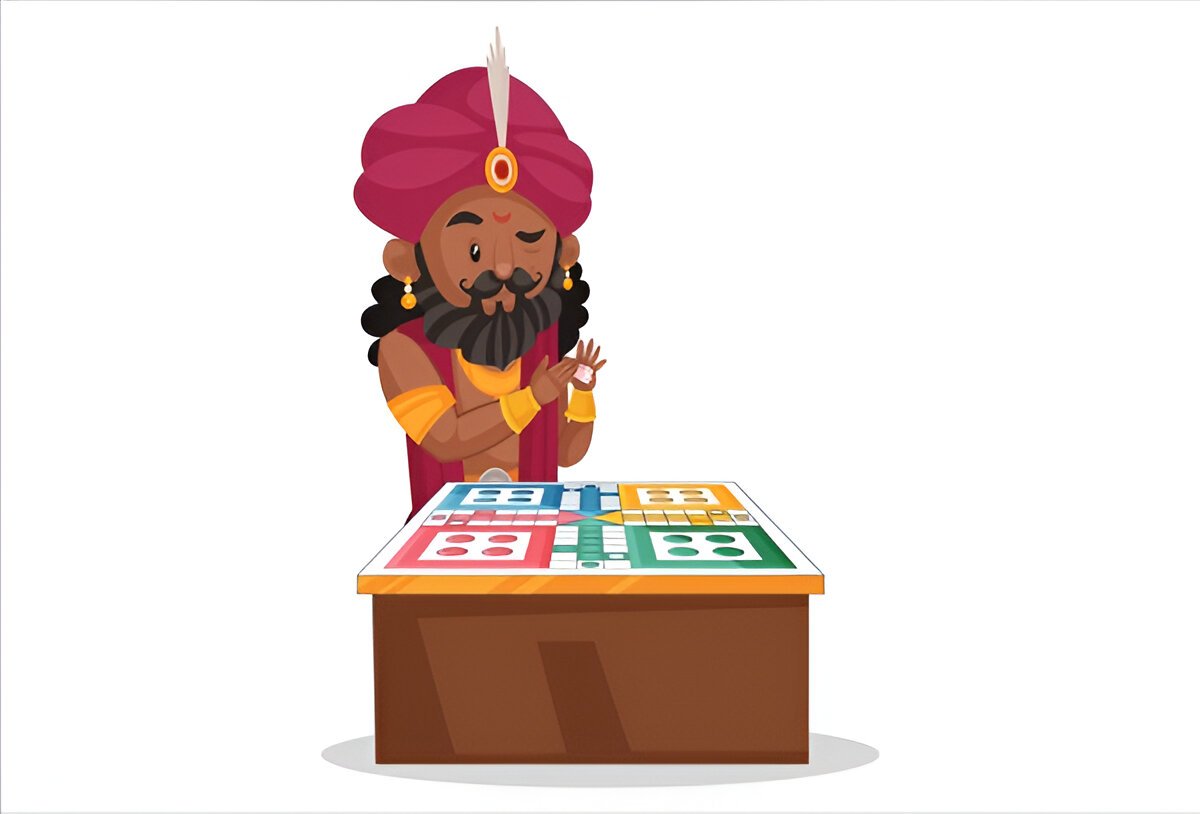Dating back to ancient civilizations, Ludo stands as one of humanity’s most cherished board games. Its captivating journey from royal courts to modern households’ weaves together strand of culture, innovation, and social connection spanning millennia.
Deep Historical Foundations
Basing on archaeological findings, Pachisi, the game which Ludo comes from, was popular in India during the 6th century. Stone carvings within the Ellora caves depict nobles and commoners alike engaged in spirited matches. Sanskrit texts mention a dice-based board game that bears striking similarities to modern Ludo, suggesting even earlier origins.
The game achieved particular prominence in the Mughal Empire. Emperor Akbar commissioned an ambitious architectural feat at Fatehpur Sikri – a colossal courtyard fashioned into a living Pachisi board. Contemporary accounts describe courtiers donning vibrant attire to serve as human game pieces, moving across red and white marble squares according to traditional cowrie shell throws.
Victorian Transformation
The late 19th century marked a pivotal evolution in the game’s history. British civil servant Alfred Collier drew inspiration from Pachisi during his tenure in colonial India. Recognizing its potential for Western audiences, he streamlined the complex ludo game rules and standardized the ludo playing elements. His 1896 patent application outlined crucial modifications:
- The board received simplified geometric layout.
- Player pieces were reduced to a manageable number.
- Fixed dice replaced traditional cowrie shells.
- Clear victory conditions were established.
Rather than inventing an entirely new game, Collier’s genius lay in adapting an ancient pastime for modern sensibilities while preserving its fundamental appeal.
Commercial Rise
London’s venerable game maker John Jaques & Son recognized Ludo’s commercial promise. Their refined version introduced the now-iconic colored pawns and crisp board design. Strategic marketing positioned it as an ideal family activity, balancing accessibility with engaging gameplay mechanics.
Global Cultural Impact
Ludo’s elegant simplicity enabled it to transcend borders, spawning distinct regional variants:
German families embraced “Mensch ärgere Dich nicht” in the early 1900s American households adopted “Parcheesi” with enthusiasm Spanish-speaking regions developed “Parchís” Colombia’s “Parqués” added unique local flourishes.
Contemporary Evolution
The digital revolution has ushered Ludo into new territories. Mobile platforms and online ludo game with friends options have introduced classic ludo gameplay to fresh audiences while maintaining its core charm. Modern iterations incorporate:
- Real-time matchmaking systems.
- Global leaderboards.
- In-game achievements.
- Social features.
Enduring Appeal
Several factors contribute to Ludo’s remarkable longevity:
Intuitive Mechanics: New players quickly grasp the fundamentals.
Social Dynamics: The Ludogame naturally facilitates interaction.
Strategic Depth: Thoughtful decisions influence outcomes despite chance elements.
Universal Theme: The race-to-finish concept resonates across cultures.
Educational Benefits
Beyond entertainment, Ludo fun develops crucial skills:
Mathematical Reasoning: Ludo Players constantly calculates moves.
Strategic Planning: Success requires forward thinking.
Social Development: Face-to-face play builds interpersonal abilities.
Rule Following: Clear guidelines teach structured decision-making.
Standard Rules
While regional variations exist, core gameplay remains consistent:
- Four participants compete (adaptable for 2-3 players).
- Each control four tokens.
- Initial movement requires rolling a six.
- Clockwise progression around the board Landing on opponents enables captures.
- Victory achieved by guiding all pieces home.
Future Horizons
Contemporary technology continues expanding Ludo’s possibilities. Virtual reality implementations and augmented reality features hint at innovative playing experiences while preserving traditional elements that have captivated players for generations.
Looking Back, Moving Forward
Ludo’s progress is a testament of how games may outgrow the conditions of their creation and advance to the level of cultural phenomena. From ancient Indian courts to modern digital platforms, it has maintained relevance by adapting while retaining core principles that spark joy and connection.
Rather than crediting a single inventor, we might better understand Ludo as humanity’s collective achievement – a game shaped by countless players and innovators across time. Each generation has contributed to its development while preserving the essential magic that makes sitting down for a match as exciting today as it was centuries ago.
As we roll dice and move pieces in friendly competition, we participate in an unbroken chain of human experience. Ludo reminds us that the simplest pleasures often prove the most enduring, bringing people together across boundaries of time, culture, and geography through the timeless joy of play.



